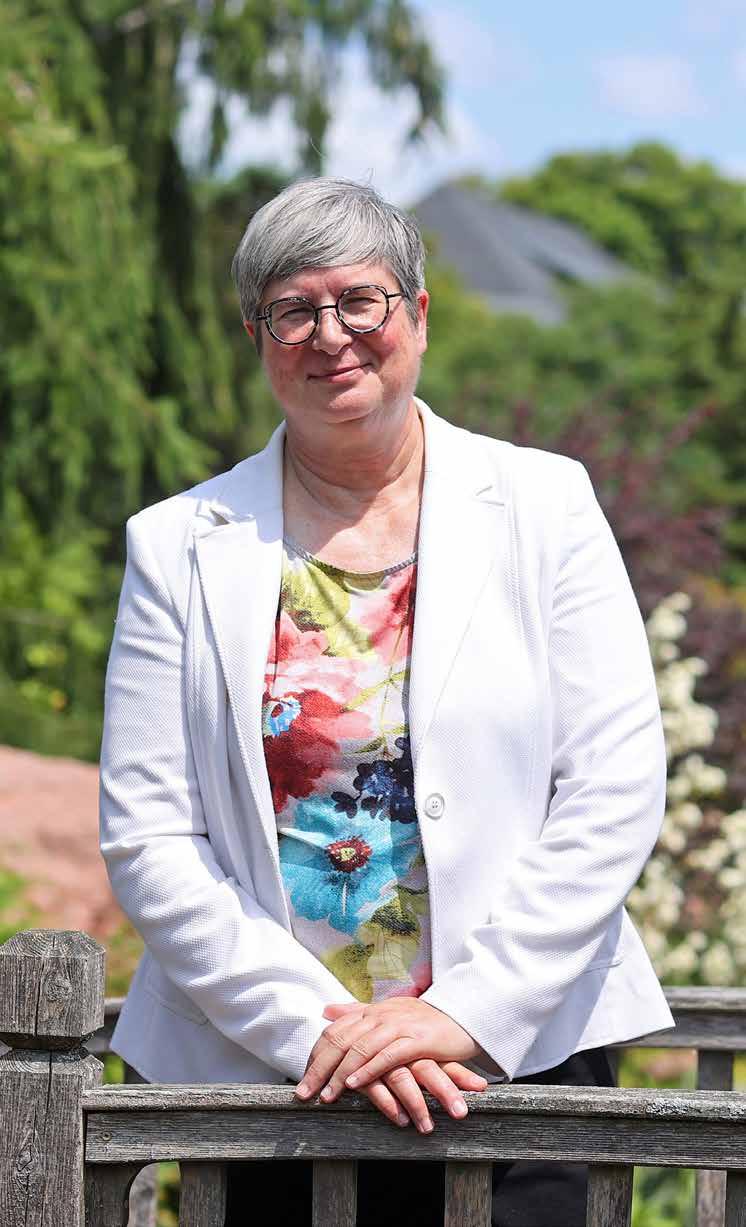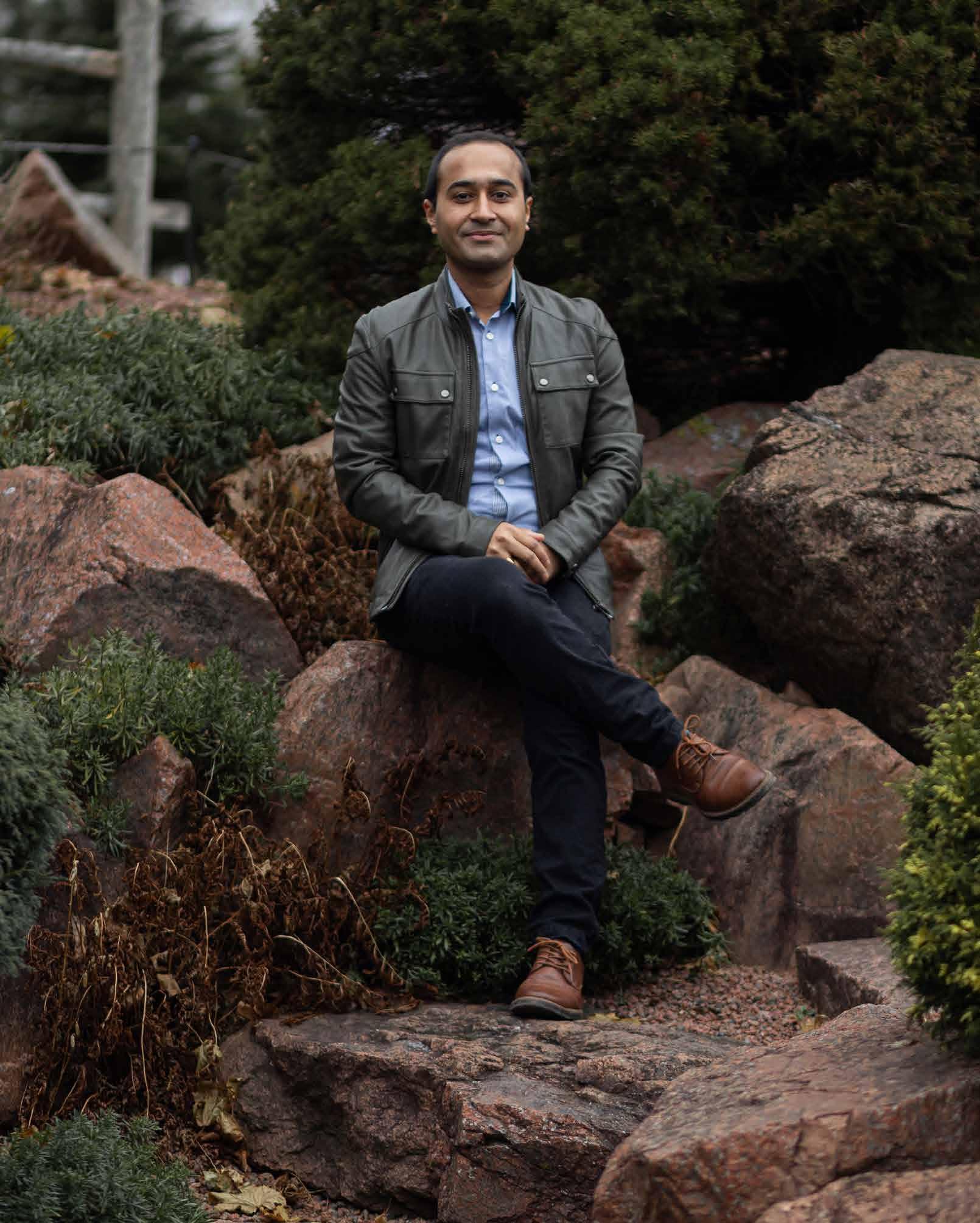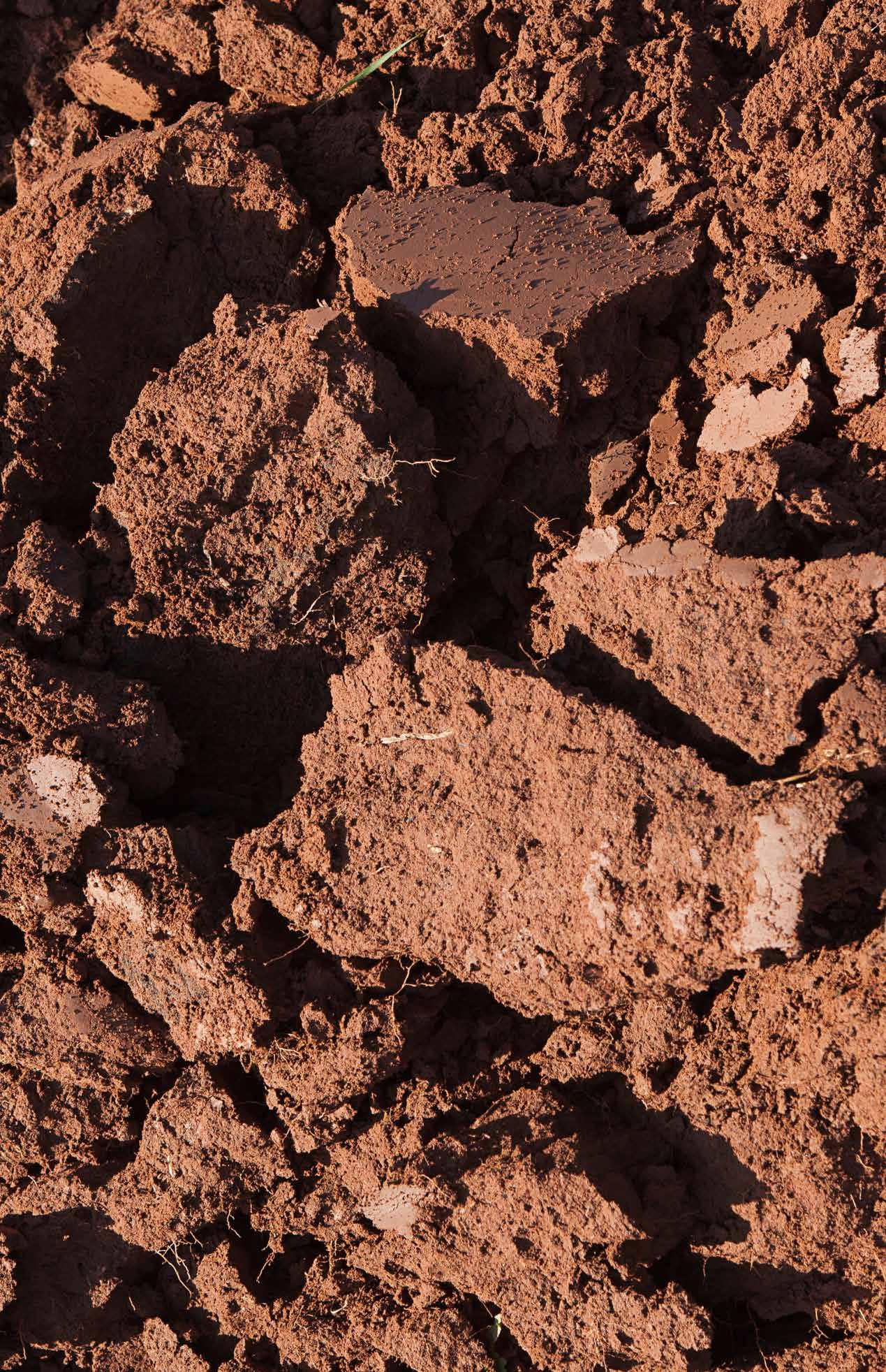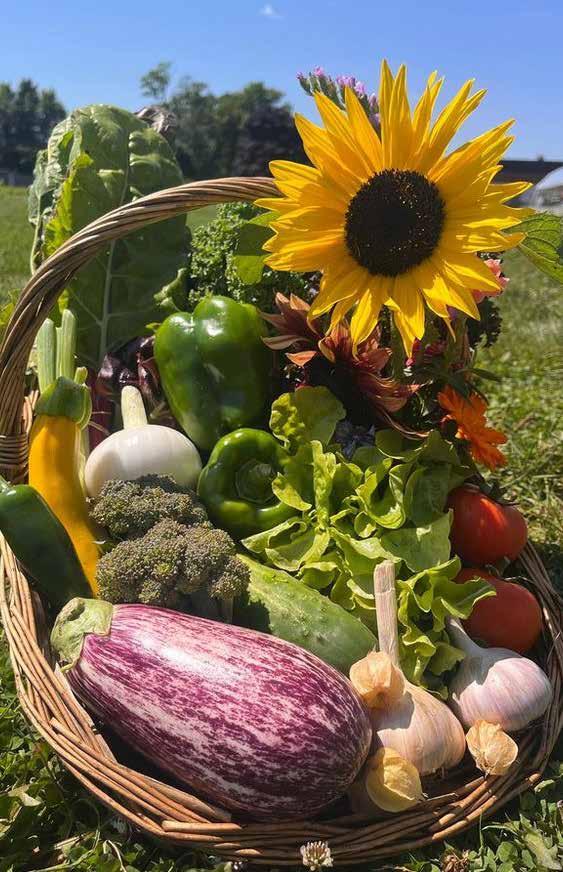Why Agriculture Community Report

2023–2024


2023–2024

As I settle into my new role as dean and campus principal, I am continually amazed at the depth and breadth of the research, teaching, international activities and community involvement here at the Faculty of Agriculture.
Something to be very proud of is the partnership with the Fujian Agriculture and Forestry University, from which a jointly run college in China was established with its first cohort of students beginning studies this past fall. Also in the international space, we became a twinning partner in the development of a new, smart agricultural campus in Romblon Province, Philippines. Additionally, there were 12 new Collaborative Online International Learning opportunities for students developed enabling our students to partner with international students in virtual learning experiences.
Our success in research continued, with an historic grant of $6.9 million led by Dr. Brandon Heung received to modernize Canada’s soil-data infrastructure. Our local partners are incredibly important as well to
the success of our programs, and we are very grateful to Kubota Canada and local retailer Central Equipment providing the use of six pieces of landscape and grounds maintenance equipment for a second three-year period.
We are an important part of Truro, Bible Hill and surrounding areas, and I was so pleased to experience my first Community Day last July, a tradition over 50 years strong on this campus. The community response was uplifting and demonstrated the strong connection between our campus and our community.
We have much to be proud of and much to look forward to and I am delighted to play a role in leading the Faculty of Agriculture and the Agricultural Campus into such a bright future.

Dr.
Heather Bruce
Dean & Principal, Faculty of Agriculture
The Faculty of Agriculture is committed to making important contributions to slow the rate of GHG concentrations by developing agricultural and landscape practices that reduce or offset negative impacts on the environment, increase farmer income, support sustainable communities, improve soil productive and water quality and enhance wildlife habitats.
• Dr. Heather Bruce became dean and campus principal of the Faculty of Agriculture effective September 16th, 2024. Dr. Bruce was formerly the chair of the Department of Agricultural, Food and Nutritional Science at the University of Alberta and professor, Carcass and Meat Science. Dr. Bruce is excited for the opportunity to lead the Faculty of Agriculture over her five-year term.
• The Nova Scotia Farm Technician Apprenticeship Program was modeled after the PEI program with the first apprentices starting Level 1 training in January 2024 with work on developing curriculum for Level 2 training for winter 2025.
• Work continued to pursue a funding arrangement with UpSkill Canada to develop and deliver a work readiness program for Atlantic Canada employers in the field of precision and digital agriculture. This is part of a national initiative of Innovation, Science, and Economic Development Canada.
• Extended Learning continues to offer relevant regulatory programs in key areas such as pest management, tractor safety, and bulk milk grader training on demand throughout the year.

Dalhousie’s Faculty of Agriculture and the Fujian Agriculture and Forestry University in China took the next step in their academic partnership and established a jointly run college in China. Two bachelor’s degrees-one in Landscape Architecture and the other in Agricultural Economics-will be offered to start. Students will be full-time students of both FAFU and DAL. The bachelor programs will adopt a 4+0 mode whereby students complete their study on the FAFU campus in four years. During the four years, students may voluntarily go to Dalhousie for study, exchange, or research.
• Renovations at the Atlantic Poultry Research Centre were a significant step forward for both animal welfare and agricultural education in the region. Transitioning to an enriched colony system not only enhances the living conditions for hens but also aligns with the industry’s movement toward more humane practices.
• Dr. Chijioke Emenike was awarded a Fellowship from Carnegie African Diaspora Fellowship Program. This is a prestigious award that will foster relations between Dalhousie and Tanzanian Institutions.
• Changes to the Bachelor of Technology – Landscape Architecture program included a program name change to Bachelor of Landscape Architecture - the professional norm. The Diploma in Technology – Managed Landscapes is now a Diploma in Landscape Horticulture.
• Drs. Talan Iscan and Kathleen Kevany of Dalhousie University joined the MacEachen Institute for Public Policy and Governance as Project Leads. At the Institute, they will lead a project that will inform recommendations for policymakers in the agricultural sector that will support the sector in meeting Canada’s climate goals and the nutritional needs of Canadians.
• Bringing Worlds together was the theme of Community Day 2024 on the Agricultural Campus. This annual tradition is over 50 years strong and provides an opportunity for the local community to come to campus and learn about the impact Dalhousie University is having locally, globally and internationally.
• A Memorandum of Understanding between Romblon State University (RSU) and Dalhousie University was signed as a twinning partner in the development of a new, smart agricultural campus in Romblon Province, Philippines. Dal AC International is in the planning stages of offering a summer 2025 Enrichment Camp for 20 students from RSU in agriculture and fisheries.
• Kubota Canada provided the use of six pieces of landscape and grounds maintenance equipment for a second three-year period. This leading-edge equipment and technology supports managed landscapes programs and campus operations. Valued at nearly $30,000 per year, the agreement with Kubota Canada and local retailer Central Equipment, provides an opportunity to renew for an additional three-year period, with rolling annual commitments.

Dr. Sonil Nanda was named a Tier 2 Canada Research Chair in Clean Agricultural Technology and Energy. His research program aims to demonstrate how advanced thermochemical, hydrothermal, and biological methods can be used to convert the by-products of agriculture and forestry into high-value biofuels. His work promises to develop scalable and commercially viable solutions for clean energy and decarbonization that leverage currently available infrastructures for fuel production and distribution.
• Eleven Dal AC students explored the Dairy Industry and Farm Management in the Netherlands. Travel abroad helps change perceptions and perspective on farming techniques which youth can implement here in Canada.
• Indigenous students participated in travel to Dominica in February through partnership with the international office. During their travel, students were able to visit and interact with the indigenous peoples of the island. Students returned with a gratitude for their travel, made possible by Dal AC international team.
• Nine students participated in a Study Abroad Opportunity funded through Global Skills Opportunities. The group travelled to Hartpury University in the UK, to explore equine studies from a leading University. Travel abroad exposes youth to global challenges and opportunities while building their academic and vocational records.
• Eight students traveled to Dominica State College (DSC) to study forest resource management through an Indigenous lens. DSC is a long-standing partner, and Dominica is home to the largest living population of Kalinago people. The trip was funded through Global Skills Opportunities.
• Lana Bos and David Parks from Dal AC joined colleagues from North Island College and College of the North Atlantic in Mombasa, Kenya to launch the Kenya Blue Economy Skills Training Project. This is a four-year project funded by Global Affairs Canada and administered by Colleges and Institutes Canada, which Dal AC will lead to empower local vocational schools in Mombasa to strengthen programming, teaching facilities and employability of their graduates into the Blue Economy.
• Sixteen students explored Wildlife Ecology in South Africa; a Global Skills Opportunity funded Field Course. In partnership with Rhodes University, students spent three weeks learning and researching animal ecology relating to their chosen career path while strengthening life and work skills and gaining a global appreciation of wildlife.
• Dal AC International hosted the 5th annual Global Reach Symposium, where graduate students shared their research with colleagues around the world! In attendance were students and faculty from Fujian Agriculture and Forestry University, Tamil Nadu Agricultural University, Meru University of Science and Technology, University of Philippines Los Banos, Mariano Marcos State University, West Visayas State University, and University of Philippines Visayas.
• Faculty at Dal AC developed 12 new Collaborative Online International Learning opportunities for students to partner with international students in a virtual learning experience. Students and faculty travel the world virtually and gain real life experience discussing global agricultural challenges and solutions.
• Two students from Meru University of Science and Technology (Kenya) visited Dal AC, supported by the Study in Canada scholarships funded by Global Affairs Canada. They were joined by two students from Airlangga University (Indonesia) who will be supported by Canada-ASEAN Scholarships and Educational Exchanges for Development Scholarship. Students will undertake supervised research for a period of six months.
• Cynthia Parks developed sessions in the Clean Leadership Summer Internship Program to assist students with career exploration.
• Dr. Lord Abbey travelled to St. Lucia to work on cropping systems research: improvement soil fertility using leguminous crops and improving microclimate for yam plants in a plantain, yam and beans mixed cropping system.
• As part of the National Living Labs program funded by AAFC and delivered in conjunction with the NSFA and Perennia and conducted on participating local farms, Dr. Derek Lynch and his team are tracking changes in soil carbon amounts and types (active or more stored carbon) to help mitigate climate change through soil sequestration.
• Dr. Mason MacDonald received approximately $280,000 from Net Zero Atlantic combined with Mitacs funding to determine the carbon budget associated with Nova Scotia’s natural Christmas Tree industry. Dr. MacDonald’s team will then seek to design technologies to increase carbon sequestration in managed lots.
• Dr. MacDonald also received approximately $40,000 from the Sustainable Canadian Agriculture Partnership to explore strategies to naturally improve tree growth and survivability in the face of increasing environmental stressors from climate change.
• Dr. Paul Manning received a Partner for a National Grant (NSERC – Alliance) studying the transmissions of plant pathogens by migratory leaf hoppers under climate change.
• Dr. Paul Manning co-led the second offering of the multi-disciplinary course “Measuring Food Sustainability” jointly offered between the Faculty of Agriculture and the College of Sustainability
• Frank Cheang hired as an instructor to teach at FAFU beginning October 2024.

The Faculty of Agriculture is committed to improving food security locally and globally through our teaching, research, international activities and local partnerships.
• Bridge Into Agriculture is a 22-week program for members of the African Nova Scotian Community. Now in year three, the program goals are to enable participants to gain the skills to grow a small vegetable garden. The program is done in partnership with African Nova Scotia Affairs and the NS Dept of Agriculture. Eighteen learners enrolled with 30+ enrollments in year one and two.
• Partnering with AC International, a four-week learning experience and trip to the US for past Bridge into Agriculture participants was held to visit black-led community food and farming initiatives.
• Organic Vegetable Gardener, a fully online, self-study course available for those interested in growing their own backyard garden had over 60 enrollments in 23-24.
• Cultiv8 Chef hosted 20 students this past academic year teaching kitchen skills, food preservation and value-added product development, fostering entrepreneurship and food security.
• McCain Foods supported another five-year Industry Research Chair as part of Dr. Ahmad Al-Mallahi’s research program demonstrating McCain’s commitment to continued partnership.
• Five new post doctoral fellows at the Faculty of Agriculture are addressing food insecurity, water quality and availability, soil degradation and more thanks to the generous funding of the McCain Foundation.

The Government of Canada committed $6.9 million over five years to a Dalhousie-led research program focused on modernizing Canada’s soil-data infrastructure. This historic grant — the largest ever awarded to Dalhousie’s Faculty of Agriculture — will support a national team of researchers to oversee the delivery of the senate recommendations related to soil data, monitoring, and mapping.
• Dr. Kathleen Kevany coordinated the production of the Routledge Handbook of Sustainable Diets which provides creative, compassionate, critical, and collaborative solutions.
• Nova Nourishment is a collaborative pilot program with other universities to improve food security and sovereignty on campuses. Led by Cultiv8 interns, four students worked to assess the state of food sustainability and security on campus and designed innovative solutions to address these issues.
• A showcase of innovation was held as part of the university’s inaugural innovation week aimed at showcasing ventures and innovations springing up across campus and the dynamic network of programming and support offered in the university entrepreneurship and innovation ecosystem.
• Twenty-four students in Grades 7 – 12 participated in the Culture of Growing program, a youth-led community garden and greenhouse program that contributes to community food security.
• Community Education initiatives included 15 school visits, eight field trips to campus, nine events held on campus reaching 3300 people.
• Eleven students travelled to Ilocos Norte in the Philippines on a Tropical Aquaculture Field Course, funded through Global Skills Opportunities. Students partnered with Mariano Marcos State University staff and students to learn about food systems in tropical aquaculture.
• Seven students travelled to Meru, Kenya where they were immersed for two weeks studying food security and international development with partners at Meru University of Science and Technology. The course was partially funded through Global Skills Opportunities, and students had a once-in-a-lifetime experience to gain a deeper understanding of global food security challenges.
• Dr. Mason MacDonald and his team began work on seed priming technologies with natural antioxidants to improve brassica yields. Greenhouse work and preliminary field trials have been promising to date.
• Dr. Xiaohong Sun’s lab is focused on developing sustainable protein sources for human consumption and novel food-derived bioactive peptides as functional foods to promote human health. Over the past year, Dr. Sun’s group successfully developed an effective method for extracting proteins from red seaweed, highlighting its potential as a protein alternative and addressing both local and global sustainability challenges.
• The Organic Agriculture Centre of Canada is co-managing the next iteration of the national Organic Science Cluster program in collaboration with its industry partner. This national program is the umbrella for 14 research projects across Canada that seeks sustainable and ecological alternatives to agricultural production including evaluating recycled nutrient sources as soil fertility amendments, identifying practices that sequester carbon in the soil, and identifying non-chemical practices for controlling pests.
• Dr. Andrew Hammermeister with the Organic Agriculture Centre of Canada was co-applicant exploring the potential of flax as a crop for fibre production in Nova Scotia.
• Dal welcomed six new Schulich recipients, three receiving engineering scholarships ($120,000) and three receiving science, math and tech scholarships ($100,000) including Jami McDowell at the Faculty of Agriculture.
• Brandon Heung was hired to a new Canda Research Chair position jointly with Computer Science.
• Natalie Diether was hired as Assistant Professor in Animal Science and Aqaculture
• Suresh Neethirajan was hired as Associate Professor in Animal Science and Aquaculture.
The Faculty of Agriculture is committed to supporting health and well-being locally and globally and improving public trust in the role agriculture plays in sustaining healthy communities and ecosystems.
• A new three-year renewable MOU with Corrections Canada will enable the Horticulture Skills Training Program to continue at the Nova Institute for women.
• Master Gardener Summer School was retooled to include health and wellness activities in addition to top notch skills development – the Master Gardener Summer School had its highest enrollment in several years, with 19 participants from Nova Scotia, New Brunswick, Prince Edward Island, Newfoundland, and Ontario.
• The Agricultural Campus continues to extend its academic program offerings by welcoming additional Faculties to campus. The Truro Start program offers students the opportunity to complete their first year of studies on the Truro campus and transition into Halifax for years two and beyond. Participating Faculties include Science, Computer Science and new as of Fall 2024, Arts and Social Sciences. Recreation Management will join the Truro Start program in the Fall of 2025.
• Awtiket indigenous youth camp expanded from two days to five days having secured additional funding. This camp has proven to be successful in both securing applicants for the indigenous student access pathway and Truro first year start programs.
• The campus welcome 35 new students under the Truro Start program in the fall of 2024.

A powerful symbol for Indigenous Peoples- the eagle feather - was added to campus in the form of a Seven Feathers crosswalk adjacent to Cumming Hall and Sipu Awti. The installation of the crosswalk marks another important step the University is taking towards reconciliation while acknowledging the legacy of residential schools in Canada.
The seven feathers symbolize the seven sacred teachings of Love, Respect, Courage, Honesty, Humility, Truth, and Wisdom and the installation of this crosswalk, the second in the province, helps to encourage and provide a welcoming community for all learners.
• The Athletic Centre re-opened in early January boasting a new gym floor, air conditioning in the strength and cardio section of the facility, and new weight room equipment.
• Rams summer camp programs for 2024 welcomed 250 youth to campus to participate in Volleyball, Soccer, Badminton, Basketball and Mini University.
• Dal AC/NSAC was recognized for hosting the most CCAA National Championships (22) in the last 50 years compared to any other institution in Canada.
• Athletics hosted the 2023 CCAA National Cross-Country Championship. Women’s Loggersports won the CILA National Championship, and we will be entering ACAA Men’s Volleyball this fall.
• Dr. Vasantha Rupasinghe is developing a manufacturing process for pet nutraceutical products to help manage cancers of dogs in collaboration with Canadian pet nutraceutical company Adored Beast Apothecary.
• Dr. Derek Lynch was honoured with the award of Outstanding Leadership in Organic Science.
• A powerful symbol for Indigenous Peoples- the eagle feather - was added to campus in the form of a Seven Feathers crosswalk adjacent to Cumming Hall and Sipu Awti.
• Cynthia Parks developed and delivered sessions for 50 Grade 3 students participating in “Agriculture in the Classroom” to guide school age children in the importance of food and agriculture.
• Two instructors and an assistant professor were hired in the department of Plant, Food and Environmental Sciences.
• Ashley MacDonald was hired as a Limited Term Instructor in Business and Social Sciences.


dal.ca/agriculture